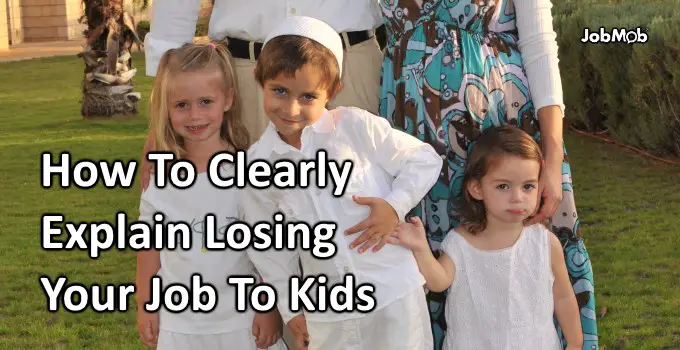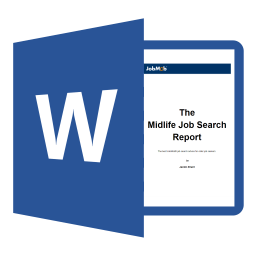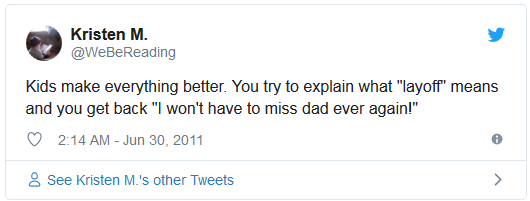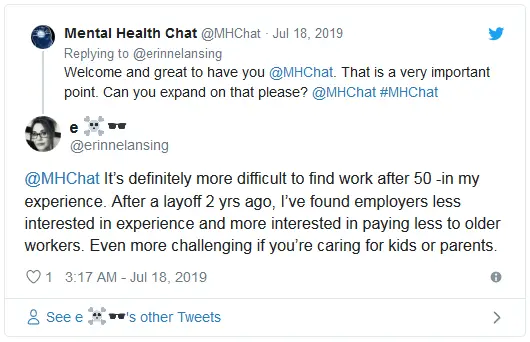The best way to tell your family you lost your job.

My own layoff story
I was last laid off in early 2006.
At that time, I had 2 kids aged 3 and 2. To me they seemed too young for the layoff to have much meaning in their eyes, but I was wrong.
Before the layoff, my kids barely saw me each weekday. I would leave for work early and come home as they were getting ready for bed, or later.
After the layoff, they saw me all the time. My new job – the job search – gave me the flexibility to take the kids to school and pick them up afterward while still networking, getting interviewed, etc.
My wife and I didn't make a big deal of the change, and to be honest, we didn't really spend much time thinking about whether that was the best way to react. We just told the kids that I would working from home from now on and they took it in stride. Or “Yay!” as they put it.
Looking back recently, I was curious to hear what child experts would say.
Free bonus: The Midlife Job Search Report is a handy guide I compiled for older job seekers. Download it now.
Be honest and patient
Russell Friedman, former Executive Director of The Grief Recovery Institute Educational Foundation, blogger for Psychology Today and co-author of 3 books including When Children Grieve, suggested:
- Adults—you go first. Telling the truth about your own feelings about your work situation will make it safe for your child to open up about his or her feelings.
- Remember that each of your children is unique and each has a unique relationship to the loss event or situation.
- Be patient. Don’t force them to talk about it.
- Never say “Don’t feel sad” or Don’t feel scared.” Sadness or fear are the two most normal feelings in reaction to loss or change of any kind. They are also essential feelings to being human.
- When they do talk, listen with your heart not your head. Allow all emotions to be expressed without judgment, criticism, or analysis.
React carefully
Dr. Elizabeth R. Lombardo, Ph.D., M.S., P.T. and author of “A Happy You: Your Ultimate Prescription to Happiness,” says:
We often assume that children will be so worried if Daddy is not working, but that is not the case. What causes them stress is parents’ reaction to Daddy’s unemployment.
Unlike parents, children are not calculating the cost of the mortgage and monthly bills, stressed that they cannot be paid. They are not tormented by fears that they may never get another job, or at least not before they lose their home. Children are much more in the here and now. So what is important to them is (1) Daddy is now home to play with me and (2) how Mommy and Daddy are feeling.
Children can be incredibly intuitive. They may not understand why parents are stressed but they can sense something is wrong if you are.
So, how do you tell your young child that their father is unemployed? Try something like “Daddy is not working right now. He will be getting another job soon. Now he is going to focus spending some time playing with you.” You can even highlight some things they might do together (read book, go to the park, play ball…)
More importantly than what you say, though, is your reaction. Try to address your stress level- what you outwardly say and do as well as how you feel inside. Again, children can sense your stress, which then can cause anxiety for them.
Have the right attitude going forward
Vicki Hoefle, 20 Year Parent Educator, Mother of 5 teens and creator of Parenting On Track™, recommends:
- Children follow their parents lead so attitude is everything. You convey your confidence or lack their off with not only your words, but your voice, tone, body language and eye contact.
- Children can feel a parents' confidence and take their cues from this.
- As you explain the “change” in employment, the details will not be as important as your attitude about this change.
- Most children can not comprehend the idea of work, let alone the idea of unemployment. Narrow this down and talk about it from the child's perspective. Think about how this might impact the child's life. Maybe you will be home in the morning to take them to school. Maybe you will be home at night to have dinner with the family. It isn't as important to talk about the fact that you may have less money to spend on eating out, kids don't pay attention to that. Talk about the tangible changes your children will notice.
- Children do not need updates. They only require that when a significant change, like another job, or moving because you have to sell the house, is explained to the extend that they can assimilate the information. Again, your attitude of “things will be fine, I know what I am doing” is the only thing that matters to young children.
- So curb the desire to tell the kids everything. Use discernment and community a sense of confidence and security to your children during this transitional time.
Involve children at their level
Heather Davis Richards, former VP of Public Affairs for financial education company Essential Knowledge, tells:
Little kids are very resilient to change. They can actually be a huge asset to the family, with their eagerness to be involved. We have seen children all over the world work to raise money for cancer victims, animal rights, and other topics that seem overwhelming. So when it comes to a layoff in the family, it’s best to get them involved at a level they can understand.
First, discuss with your spouse privately, how you both intend to deal with the situation. What budget cuts will need to be made? What changes will that mean? We planned in advance, what the job loss would mean to the family, and how we would cope with the situation. In our family, when my husband was laid off, we decided to cancel after school childcare to save money.
The two biggest questions that children have with this type of situation are, “how will this impact me?” and “should I be scared about this?”
When we discussed it with our seven-year-old, we made sure to stress that everything was going to be fine. There would be changes for awhile, and we made sure to state upfront how that might impact her. She was actually overjoyed at some of the decisions. She was thrilled to be able to ride the bus after school, for instance.
We also asked for her help. We asked for her to help us to look for ways to save money while looking for a new position. She offered to forfeit her allowance, and had many creative ways that we could have inexpensive fun on the weekends. When her birthday rolled around, she came up with the idea for a party at home to cut costs. Don’t be afraid to enlist your children’s help, it empowers them that they are a part of the solution.
Takeaway lessons
- Decide with your spouse how the family should cope with the post-layoff situation
- Tell your family about the layoff without going into details
- Assure your children that everything will be ok (easier said than believed, I know)
- Involve your children in any lifestyle changes, such as cost-cutting
Question of the article
What about you: how have you dealt with unemployment in your family? Tell us in the comments.
Free BonusThe Midlife Job Search Report is a handy guide I compiled to help older job seekers.
This free download contains:- 5 Common Mistakes Older Job Seekers Make
- How To Defeat Any Form of Job Search Discrimination
- How Older Job Seekers Beat These Common Stereotypes
- 9 Scary Reasons Overqualified Job Seekers are Rejected
- 40 Tips for Older Job Seekers That Actually Get Results

JobMob Insiders can get this free bonus and other exclusive content in the JobMob Insider Bonuses area. Join now, it's free!
READ NEXT: Recently Laid Off? Here’s A Quick Job Search Refresher Guide
Subscribe to JobMob via RSS or email and follow me on Twitter for more ideas on how to deal with unemployment in the family.





Pingback: Jacob Share
Pingback: prestonbow
Terrific advice. Will RT and include in posts. Thanks for finding/sharing this.
Adults forget sometimes the kids are listening/watching/reacting to every thing.
Pingback: Neo Recruitment
Pingback: Nikki Clifton
Pingback: Tweets that mention Family Unemployment: How To Explain Being Unemployed To Children | JobMob -- Topsy.com
Pingback: Melissa Cooley
Excellent post!
While Rodney was laid off, DD (then 3.5 yrs) was amazingly perceptive. She wanted to know when she could start taking swimming lessons again, why we got rid of our van instead of fixing it, etc.
When we did tell her that he was not working for his company anymore, she asked, “They don’t like him?” It broke my heart to see the sadness on her face when she thought that someone didn’t like her daddy.
Through it all, we helped her to understand that the most important thing was the love and support of each other.
Good for you all, Melissa. Your daughter’s reaction was so adorable, I can imagine feeling the same way. How have things been since then? Does she ask about Rodney’s job prospects (although I don’t think she’d put it that way) or anything else that’s related?
Rodney was actually called back by his employer! He’s in his second week back. As you can imagine, we are happy at how things worked out.
While he was laid off, DD would ask about him when he was interviewing. I told her he was at meetings to talk with people about working for them. Sometimes I would show her the logo of the place he was interviewing with (it’s funny how good she is with logo recognition). It seemed to help her understand what was happening and gave her a sense of pride in her daddy.
That’s terrific news! I’m ecstatic for you all. Now that the job quest is over, what will happen to the blog?
I’ve also noticed how my kids retain logos so well. It’s a little spooky sometimes.
Good question. We’ve met many wonderful people (like you) online and have been supported tremendously through a very tough time. I definitely want to “pay it forward” and have something in mind that I hope will help others who are on their own job quests. I just have to put the pieces together and see what works!
Pingback: Jak wytłumaczyć dzieciom, że jesteśmy bezrobotni
Pingback: Jason Monastra
the truth works.
in israel being ‘laid off’ in the marketing realm is so common… my kids know that when i work, they see me less in the mornings. and when i am job searching they see me more.
they miss me when i am working.
they also know that i need to work – so that we can have an easier life. but that doesn’t mean that when i am not working – our lives are more difficult.
for them, job hunting is just another type of employment.
and they go with the flow – very well.
🙂 Miki
Smart kids- job hunting *is* just another form of employment.
Since you seem to have done it successfully a few times, what’s your secret for getting hired again after a layoff?
Pingback: Doing #FF on The Job Quest « The Job Quest
Pingback: Are Illusions THAT Important? : The Job Quest
Your writing is at its best when you write about your family Jacob. I really like knowing you have a life as well as a blog.
Excellent article! Very relevant points.
Once, when my children were much MUCH younger and I was playing car-pool dad for my son and his buddies to kindergarten, I overheard my son from the back seat saying that his father (me) had been “burned”. He understood the term “fired” as something else. It was at this point that I began considering how my situation affects my family, and included them in necessary family updates. Clear, open lines of communication are essential in relationships. (smile)
You said it!
Cute story, thanks for sharing, Stewart.
Well, lets see. We all tell our kids not to lie and no matter what they can always tell us the truth..Right ? I would tell my kids the truth and if I played a part in myself losing the job, I would tell them why and explain that it was a consequence of a bad decision. If I was not at fault, I would explain the reasons behind me losing my job. Only if they were old enough to understand. Just saying
That makes a lot of sense. If they’re old enough to understand, it’s a lesson into how the world works
I’d like to offer a perspective as someone who is now an adult, but remembers the pain which a parental job loss caused me as a child. I wish my parents had taken the approach which is suggested here. Instead, my father, through his body language and voice, conveyed hopelessness and despair. My mother yelled at him for putting us in this situation (he had accepted a job overseas, so we all moved, but after a year, the department closed). I overheard lots of doom-filled conversations about money.
For me, it was as though my family happiness had been destroyed and couldn’t be put back together again. I became hugely anxious, and even tried to do job hunting for my Dad, though I was nine and had no idea what I was doing. I also felt a great deal of shame about my father not having a job.
This traumatic experience has had a long term effect on me and still brings me to tears as I think of it. I am now working on a children’s book for young children who have a parent who loses their job. Hopefully I can use my experience to benefit others.
Ang, thank you so much for sharing your experience with us, never an easy thing to do when it’s so painful and traumatic… and I wish you success writing such a book with such an important message. It *will* benefit others.